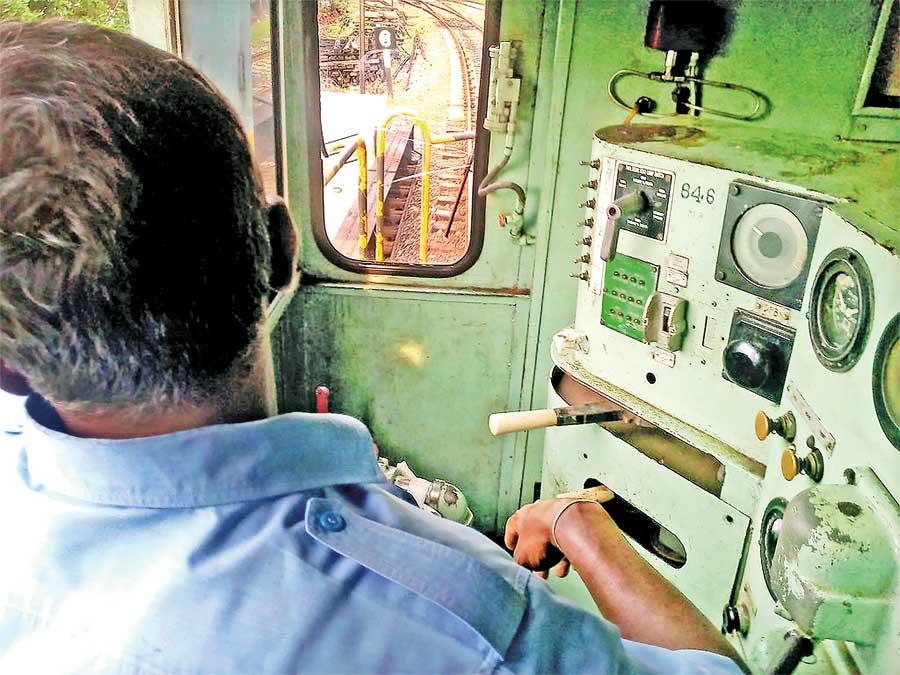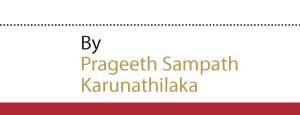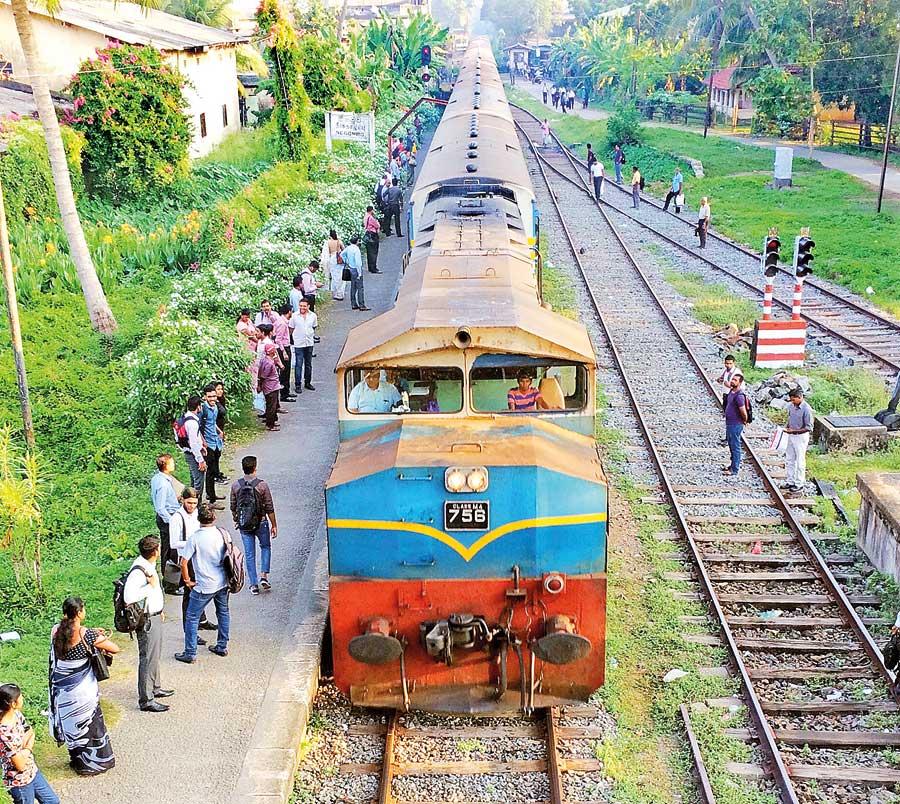22 Mar 2023 - {{hitsCtrl.values.hits}}

SLR recently announced that with the retirement of staffers there would be a shortage of train engine drivers
- There is no suitable officer or suitable system at Sri Lanka Railways to regulate the duties of train drivers
- A driver on a train doing a run from Colombo Fort and returning to base the next day is considered to be on a 24-hour shift
- Even though a clerk is employed to make timetables, he has been removed from that task and the train drivers themselves have started attending to this task
- Senior officials of Sri Lanka Railways created a position called Driver In Charge of Booking (DIB) to be given to a train driver
Sri Lanka Railways (SLR) recently announced that with the retirement of train drivers there is a shortage of locomotive engine drivers. As a result SLR had also taken steps to cancel the service of many trains expected to do long and short distance journeys. An investigation done by the Daily Mirror revealed that there are about 40 vacancies for train drivers exist. The last occasion when train engine drivers were recruited was in 2017. Currently, only 450 engine drivers are in service. Among them are drivers who will retire within a few months time after reaching the age of 60. Then, depending on the need of their services, those going on retirement will be recruited as engine drivers on contract basis. In addition to receiving their pensions they are will also be entitled to their initial salary which they’ll receive as a stipend through the contract.
service of many trains expected to do long and short distance journeys. An investigation done by the Daily Mirror revealed that there are about 40 vacancies for train drivers exist. The last occasion when train engine drivers were recruited was in 2017. Currently, only 450 engine drivers are in service. Among them are drivers who will retire within a few months time after reaching the age of 60. Then, depending on the need of their services, those going on retirement will be recruited as engine drivers on contract basis. In addition to receiving their pensions they are will also be entitled to their initial salary which they’ll receive as a stipend through the contract.
Commenting on this, a former senior administrative officer of SLR said that 10-15% of the existing engine driver vacancies can be filled. But in order to do so, train drivers should be employed according to a fixed cycle, the former officer of SLR added. For example, it takes about four hours for a train driver to drive his machine from Colombo to Panadura and return to base. If the driver has worked for five hours during an 8-hour shift, takes a four-hour break in the middle and commences a new shift, it would lead to an extension of his shift. Then the driver will be paid overtime at the rate of half an hour per hour. When that driver does 8 hours of duty again, he is paid an overtime allowance of 4 hours. If that driver goes to Mirigama during that time, he would book off there and the booking off time will be nine hours. He will start working again from the morning the next day. That was the system that existed.
“I can’t talk about it. I have some urgent work. Talk to the officers of our operations department. There are people who you normally contact. Talk to them. Everyone is at work at this time. If you need to, talk to the Deputy General Manager – Operations”
- Kumara Gunasinghe General Manager Sri Lanka Railways
But now train drivers are controlled by the drivers themselves. At present train drivers are on call 24 hours of the day. Hence if a train driver comes to work today he would finish his shift after five days. After the first 8 hours, all remaining hours an engine driver works will bring him an overtime pay. That works out to as much as 112 hours per week as overtime. Also, two drivers are on roster to run a short distance train trips; which is unnecessary. A single driver can cover the two trips. According to our sources, that other driver can operate another train.
There is no suitable officer or suitable system in the railway department to regulate these activities. Earlier there were proper methods. Three train schedules were compiled to enable trains to run on railway yards named No. 1, 2 and 3. The number No. 1 yard was for express trains. The driver operating that train had a shift extending up to 8 or 9 hours. He would book off and start the shift again the next day. Then the whole trip would include 3-4 hours of overtime. But now a driver on a train doing a run from Colombo Fort and returning to base the next day is considered to be on a 24-hour shift. Due to this working arrangement some people make it appear as if they have worked continuously for a week. In such a background, the recruitment of drivers is neglected. It is not surprising that there are vacancies when a set of employees go on retirement. According to the former senior railway officer, only nine train drivers have retired on December 31, 2022.
Drivers who operate trains on short journeys see their work hours being restricted to four hours. For example a train leaving Colombo Fort and journeying to Gampaha or Panadura will take four hours to return to base. A senior official of SLR told this newspaper that engine drivers assigned for this short journey see their duty for the ending after they return to base. A spokesperson of the Engine Drivers’ Union said that an engine driver is only required to complete a four hour shift when he is assigned a short distance train journey. The spokesperson said that the service of these drivers- doing short distance journeys-can be used to sort this engine driver crisis.
The Operations Superintendent plans train schedules and decides on which trains must run. He is fully responsible for the management of Operation and Control Centres in Anuradhapura, Nawalapitiya and Colombo and the running of trains including passenger, freight and oil trains. Train drivers are assigned to running sheds such as hydraulic running shed, diesel running shed, Electrical Power Coaches Shed and the Dematagoda shed.
According to the previous system the making up of schedules and the selection of drivers came under the purview of yard officials. Their schedules were made by clerks. But today, even though a clerk is employed for that task, he has been removed from that task and the train drivers themselves have started making their own timetables. In 1985, due to politicization and trade union intervention, officers in charge of sheds were removed from all office functions related to train drivers and assistants. Senior officials of Sri Lanka Railways created a position called Driver In Charge of Booking (DIB) to be given to a train driver. By 2010, they were assigned to control train drivers and assistant drivers. According to our sources, many irregularities are associated with railway officers such as obtaining overtime for their own personal gain, amending incorrect leave records if unclear, changing attendance sheets, etc. Timetables for drivers were made in 13 stations such as Kandy, Anuradhapura, Galle, Nawalapitiya, Mahawa, Trincomalee, Batticaloa etc. This was in addition to the five yards in Colombo. The senior officer said that 36 engine drivers are employed for that purpose. Although a clerk was employed for that task, he was removed and 36 train drivers are engaged in clerical work, he added.
“While employing train drivers to make timetables, they are also employed to run trains. They are not expected to do a clerical job. I don’t know the number of engines and compartments that are currently being operated. Our job is to schedule trips”
- N.J. Idipolage Deputy General Manager (Operations)
These 36 officers have been appointed as train drivers, but they do not run trains. They are only engaged in clerical work. But they can be employed to operate 36 train services. Instead they are engaged in a duty termed as ‘drivers in charge of booking’. When the Daily Mirror inquired into this, the Deputy General Manager of Sri Lanka Railways said that many train trips are cancelled due to a shortage of 40 train drivers. In that case, if these 36 drivers are also employed to operate trains, the current shortage can be addressed. Then there will be no need to cancel trains. According to our sources these 36 officers do clerical duties but receive the overtime payments which are meant for train drivers. He added that the work of the 36 train drivers- who are currently engaged in clerical work- can be covered by the district inspector (Mechanical) positions appointed for respective sheds.
Train compartments decay
Experienced train drivers are promoted to the post of District Inspector (Mechanical) in keeping with their seniority. These officers carry out inspections of drivers and assistants in each shed. They can also be employed to operate trains when it is difficult to maintain train services. But now when there are fewer drivers, the authorities do not employ these officers and instead cancel train trips, the senior officer said.
 In addition there are a number of compartments that have not been deployed for operations and left to decay in sheds that are run. Meanwhile, 12 air-conditioned compartments are not utilised daily. SLR does not have a plan to utilise the compartments that are no longer deployed in operations due to the reconstruction of the northern railway track. 160 compartments equipped with air brakes have been brought. Before that 100 carriages had been brought. There are only 20 air brake locomotives to move as many as 270 carriages. About 4-5 more engines have been converted into air brake systems. Then there are only 25 engines for all 270 air brake compartments. Although the size of that train is enough to move all 270 carriages, the railway stations in Sri Lanka are not long enough. Therefore, it is not possible to run all the compartments as they cannot be crossed along the tracks. Those compartments are in Colombo yards. Due to this, about 50 percent of the train compartments- brought from Romania which are still in running condition, i.e. about 200 carriages- have been taken out of service so far. Those compartments are in Puttalam, Anuradhapura, Jaffna and Nawalapitiya because there is no space at Colombo railway yards. In another five years from now there will be nothing left of them. There is no one to look into those compartments. According to the senior officer people have already started to remove parts of those compartments and sell them for iron.
In addition there are a number of compartments that have not been deployed for operations and left to decay in sheds that are run. Meanwhile, 12 air-conditioned compartments are not utilised daily. SLR does not have a plan to utilise the compartments that are no longer deployed in operations due to the reconstruction of the northern railway track. 160 compartments equipped with air brakes have been brought. Before that 100 carriages had been brought. There are only 20 air brake locomotives to move as many as 270 carriages. About 4-5 more engines have been converted into air brake systems. Then there are only 25 engines for all 270 air brake compartments. Although the size of that train is enough to move all 270 carriages, the railway stations in Sri Lanka are not long enough. Therefore, it is not possible to run all the compartments as they cannot be crossed along the tracks. Those compartments are in Colombo yards. Due to this, about 50 percent of the train compartments- brought from Romania which are still in running condition, i.e. about 200 carriages- have been taken out of service so far. Those compartments are in Puttalam, Anuradhapura, Jaffna and Nawalapitiya because there is no space at Colombo railway yards. In another five years from now there will be nothing left of them. There is no one to look into those compartments. According to the senior officer people have already started to remove parts of those compartments and sell them for iron.
When inquiries were made from Railway Deputy Chief Engineer (Running Operations) Jayathilaka this official told us to contact the head of the department regarding trains being cancelled without drivers.
When we made inquiries from General Manager Sri Lanka Railways Kumara Gunasinghe about these matters he said that so far, steps had been taken to address this issue. When asked about the train drivers in service at present, he failed to provide an answer. This newspaper also asked him about employing 36 train drivers in clerical duties without employing them to operate trains. He said. “I can’t talk about it. I have some urgent work. Talk to the officers of our operations department. There are people who you normally contact. Talk to them. Everyone is at work at this time. If you need to, talk to the Deputy General Manager - Operations” he said.
We then inquired from Deputy General Manager (Operations) N.J. Idipolage. He said that there are currently 400 drivers and SLR has to cover 390 train trips. “While employing train drivers to make timetables, they are also employed to run trains. They are not expected to do a clerical job. I don’t know the number of engines and compartments that are currently being operated. Our job is to schedule trips. Currently there are 40 driver vacancies. Hence retired people were also recruited on a contract basis. They are given both a contract salary and a pension. 36 engine drivers are not engaged in clerical work. Others cannot do that job. They cannot be employed in operations as you suggest.” he added.
We also spoke to Secretary Ministry of Highways and Transport Priyantha Mayadunne about these matters connected to railways. Mayadunne said that they are trying out various suggestions and experiments. “Our plan is to run trains without inconveniencing commuters. There was a suggestion to employ one driver for short distance trips and to employ the other one to operate another train. This problem will be solved soon,” he added.
We also contacted E. L. V. J. Silva, Maintenance Officer of Maligawatta Yard to inquire into how many compartments can be utilised and whether there are unused compartments. But he refused to make comments to the media.
From March 3 to 6 there was a long vacation. After this long holiday, on March 6, a special luxury compartment was added to the Podi Menike train running to Badulla. Its fare per person from Badulla to Colombo was priced at 3000 rupees. There are 44 seats in this compartment. There was not a single passenger that day. Many people were waiting to travel to Colombo after a long vacation. The other compartments attached to Podi Menike were insufficient for the people coming to Colombo. Hence people returning to Colombo tried to book the luxury compartment by paying 3000 rupees. But they were given no opportunity. That is because all the seats in the train compartment were reserved under the name of the Ministry of Transport. Somehow, no one arrived in that air-conditioned compartment until the train reached Colombo.
“Our plan is to run trains without inconveniencing commuters. There was a suggestion to employ one driver for short distance trips and to employ the other one to operate another train”
- Priyantha Mayadunne Secretary Ministry of Highways and Transport
When we inquired about this from the Badulla Railway Station, a spokesman confirmed that the relevant compartment had been reserved by the Ministry of Transport and that the train had arrived at Badulla. He did not know who had come in the compartment. He said that the compartment which was parked in Badulla for three days was connected to Podi Menike and sent back to Colombo because it had been reserved for that day under the name of Ministry of Transport.
When we made inquiries a spokesperson of the Ministry of Transport said that the secretary had gone to Badulla by train on a personal visit. When we asked Mayadunne about this, he said that he had visited Badulla. He said that he had used the railway warrant issued by the government. He added that he went with ordinary people in an air-conditioned compartment and that he did not return in the train. “I am legally allowed to reserve a train or a carriage according to the powers vested in me,” he added.
According to old laws, the Minister of Transport, the Secretary as well as the highest ranks of the Railway Department can reserve a fully equipped carriage or train. But this is only for official duties. In that case, it is uncertain whether the secretary had reserved an air-conditioned compartment for a private trip. According to the secretary, if he had travelled with ordinary passengers and he did not return by train, one has to find out for whose needs the Ministry of Transport reserved an air-conditioned compartment for 3 days in Badulla. The total fare for the whole compartment is 132,000 rupees. That will be 264,000 rupees for both trips. It is unknown whether this compartment was empty during the two trips. But the Ministry of Transport should pay this money to the Sri Lanka Railways. Payments made in this manner amount to public money. They should have given this compartment to ordinary passengers during the return trip or added a second or third-class compartment instead. If that had been done, it would have given some relief to the people who had to travel from Badulla to Colombo while standing.
A spokesman of the transport ministry asked this newspaper to contact its Additional Secretary Tillakaratne to obtain accurate details regarding the booking of this train carriage. Accordingly, this writer tried to contact him on 8/3/2023, but a person who took our call and posed as his secretary made comments in such a way that they didn’t contribute to our conversation aimed at revealing the truth to our readers.

Much irregularities are reported to take place when engine drivers are assigned their duties
23 Nov 2024 51 minute ago
23 Nov 2024 1 hours ago
23 Nov 2024 2 hours ago
23 Nov 2024 3 hours ago
23 Nov 2024 3 hours ago